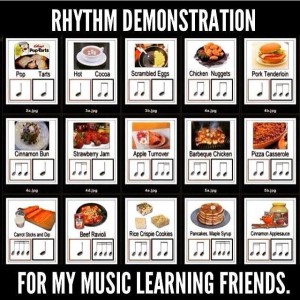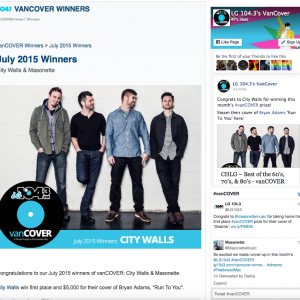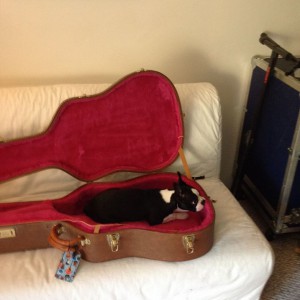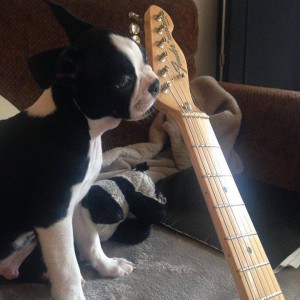Student Appreciation!
I’ve been thinking lately how lucky we are to have such a loyal student base. Some of our students have been with us for 10 plus years. We get to work with a wide range of students with different interests, age levels, and experience levels. Part of what makes the job so rewarding is the wide variety of people we get to see.
Today I thought I would deviate from my normal lesson post on guitar, bass, or drum concepts. I’ve been thinking lately how lucky we are to have such a loyal student base. Some of our students have been with us for 10 plus years. We get to work with a wide range of students with different interests, age levels, and experience levels. Part of what makes the job so rewarding is the wide variety of people we get to see. It never gets boring when day after day we are exposed to such a unique set of interested.
Another perk of the job as a music teacher is how we get to keep our ears sharp. Thanks to my students I actually know who Billie Eilish, Big Thief, and Muse are. I get to dig in to the songs, learn them and teach them. I then get to absorb and assimilate some of the ideas and they inevitably come out when I’m back to writing my own music! Amazing. Without this constant exposure to new music, I would probably have been stuck on the music I listened to when I was a kid and budding guitar enthusiast.. primarily bands like Led Zeppelin, Jimi Hendrix, Cream, Soundgarden and Red Hot Chili Peppers.
Anyhow, that’s my brief ramble for today. Thanks for the continued support Blue Guitar Studio students and for taking time to pursue such a rewarding, timeless and healing hobby as music.
Have a great day and well see you at your next lesson.
Paul
How long should I practise everyday?
A common question we get from guitar students of all levels is, “How long should I practise,” and, “How should I structure my practise session?” Both are very good questions and I’ll do my best to answer them.
A common question we get from guitar students of all levels is, “How long should I practise,” and, “How should I structure my practise session?”
Both are very good questions and I’ll do my best to answer them. For this post I will answer the first question and will deal with the next question in my next post.
“How long should I practise”?
The most important element in practising is consistency. I’m sure you all know this from other endeavours but I cannot stress this point enough. I would love to see students practising 5 days a week. In terms of how long one should practise per session, it is going to be dependant upon the goals of the individual. Here are a few common scenarios that we see at our Vancouver guitar lesson studio:
Hobbyists: these are students who just want to be able to play some of their favourite songs and perhaps be able to join in on a casual jam session with some friends. I would suggest a minimum of 15mins per day. I have found this to be a great time frame, which can suit a variety of different schedules types (working professionals, students etc). The key is to ensure you are practising the right way for 15mins! As mentioned, I will discuss the best possible routines in my next post.
Amateur to Advanced: These are students who are past the point of learning songs and are looking to improve their improv skills; are possibly preparing for gigs and performances; or even preparing for music college auditions - in this case you are going to need more time with your hands on your bass guitar, electric or acoustic guitar, or drum kit. You are going to need more time to hone your technique, and more time working on theoretical concepts of music such as scalar knowledge and even more time applying that theory to the guitar. You need to be practising constantly and hitting enough repetitions in order to actually use any of that theory in an applicable way. I would suggest a solid hour practise session day.
All of this of course is dependant on many factors and this is just a guideline. The more you practise, the quicker you are going to progress so please feel free to add more time to the routines. The only thing you must remember is CONSISTENCY. I have seen countless students begin taking music lessons with a bang. They practise a lot (far more than what we recommend), they make quick progress, and then eventually start losing momentum due to the inability to balance all of life responsibly with unmanageable practise routine they have set for themselves. They eventually stop progressing and worst case scenario stop playing altogether! Most of our students who have been the most successful have a daily routine that is sustainable. If you are extra motivated and do not tend to suffer from the prior affliction than by all means continue adding more time to your routines.
Just remember Patience and Persistence are you two best friends when it comes to improvement.
If you are interested in finding out more about our lessons please visit our contact page here!
Electric or acoustic guitar? What should I start learning on and when can I switch instruments?
When students come to us for guitar lessons a common question we hear a lot is “what should I start learning on? Acoustic or electric guitar?”
When students come to us for guitar lessons a common question we hear a lot is “what should I start learning on? Acoustic or electric guitar?”
My answer is always make your decisions based on the kind of music you like to listen or want to learn. If you want to learn how to play rock music such as the Red Hot Chilli Peppers, Nirvana, Led Zeppelin etc.. then I would suggest starting with electric. If you want to play campfire songs and more pop based stuff I would suggest acoustic. There seems to be a lot of misconception about having to learn the basics on acoustic before being able to move to electric.
Whichever you choose will have a natural carry over to the other instrument should you decide to switch at some point. Inevitably, most guitarists end up with both an electric and acoustic. Electric guitar can be a bit easier to play in the beginning due to the lighter strings but the guitar soloing techniques may be more demanding. Acoustic can be much better for leaning how to fingerpick. One thing to keep in mind is there are number of techniques in rock and blues soloing that can only be done on an electric which is why I suggest choosing electric if you are wanting to learn this kind of style of music.
Other considerations:
Size matters! If you are a smaller person you may want to consider a 3/4 size acoustic or looking into a parlour size guitar. These are excellent guitars with a full length neck but a slightly smaller body shape. You can also get 3/4 electrics aswell but because electric guitar is naturally a bit smaller and thinner most people don’t have to go smaller than a full size.
If you want to take lessons with us we do have extra acoustic and electric guitars in each of our teaching rooms which you can use during the lesson. This may better inform you what the best instrument is for your needs. If you are interested in taking lessons feel free to reach us at info@blueguitarstudio.com
Happy holidays and good luck on your quest for the right guitar!
Paul
To Tab or Not To Tab?
In lessons, many guitar students ask us if they should learn to read traditional written notation or stick with the standard tabs that can be found online in many places. I thought I would answer this ongoing question and weigh the pros and cons.
In lessons, many guitar students ask us if they should learn to read traditional written notation or stick with the standard tabs that can be found online in many places.
I thought I would answer this ongoing question and weigh the pros and cons.
Written notation:
Pros:
Gives you a solid foundation for understanding notes across the fretboard which is important when you want to get into soloing and improvisation. It can also be really helpful when you want to communicate your ideas quickly with other musicians. That said, you don’t necessarily need to read music to know the notes around the fretboard. There are more direct and simple note naming exercises, such as choosing a scale and naming horizontally on a string that can render the same benefit.
Increases an understanding of rhythm. Rhythm, in my opinion, is the most important (and the most abstract) aspect of learning the guitar, or any instrument. Many students come to me with an ability to successfully play a few chords and even approximate a strumming pattern. In most cases, there will be a limited understanding and issues with strumming patterns which may or not be obvious to the student at first. After showing them how to count, using rhythmic values from the traditional notation system they quickly begin to see that the strumming pattern they thought was correct was actually quite far from accurate. This is usually accompanied by poor mechanics with the right hand aswell. I’m a huge fan of teaching people how to read rhythm notation but again, this can be done in isolation and does not need to be accompanied by months of learning traditional notation.
Cons:
Takes a long time to learn how to read notation. I spent years at college becoming proficient in sight reading and I barely see notation in any of the professional gigs I have done. Chord charts are another issue.
It is not ideal for a pattern based instrument like guitar. If you haven’t already figured this out then you’ll know there are multiple ways to play the same note on guitar. On a piano there is only one way to play middle C. This creates confusion when playing parts on guitar and in my opinion is not ideal.
Most genres (except classical) are not written in traditional notation. You will be far more likely to find tab parts with rhymic stems attached. This is the best of both worlds. I have included a pic of my favourite type of score that includes both tab info and rhythmic notation.
Conclusion:
Don’t spend your time in guitar lessons learning traditional notation (unless you are entering a post secondary music program, or are a classical guitar player). You are far better off investing your time in becoming proficient at reading rhythm notation and tab. Then learn how to source out the best tab scores which have a combination of both and you will be able to dissect, and play any part you desire. Happy practising and I hope your guitar lessons are going great!
Semi Finalist: Canadian Songwriting Competition
Paul has been chosen as semi-finalist in the Canadian Songwriting Competition in the Country division!
Paul has been chosen as semi-finalist in the Canadian Songwriting Competition in the Country division! "Feel My Love" is a song he co-wrote with Jordan Carriere and Deborah Holland ft. Serena Pryne of the The Mandevilles. Produced by the amazing Ben Kaplan. Excited for the great honour! Check out the song below:
CBC Musical Nooners ALL AGES Show
Paul Lambert w/ City Walls will be playing a FREE ALL AGES show at the CBC Musical Nooners this month! Check out the details below, and we hope to see you there!
What: CBC Musical Nooners
Where: CBC Outdoor Stage, 700 Hamilton Street, Vancouver
When: July 24, 2017 - 12pm-1pm
New Solo Record on iTunes!
After over a year of writing and recording, I'm so excited to announce the release of my new solo record!
Sweet Relief
is now available for purchase on iTunes! Give it a listen and let me know what you think by leaving your review on iTunes!
If you'd like a hard copy of the album, please visit my website at www.paul-lambert.com/music to order a CD.
Thank you so much for your continued support!
New album Jan 23rd!
I’m super excited to share the music video for the single “Left the Best Unsaid” off my newest album Sweet Relief, to be released on January 23rd! Please “like” and “share” to spread the love!
Show time!
I am putting the finishing touches on my new solo record and celebrating with an invite only show at the Backstage Lounge on Nov 5! My band City Walls and I will be premiering some new songs from the solo record, as well as rockin’ some Louder Than Love and City Walls classics. Pre-sale tix: $15 (available at eventbrite)
Door: $20 (subject to availability)
Show time 8pm – 11pm
www.thebackstagelounge.com

Guitar lesson on David Gilmour's style
My favourite guitar player and a great guitar lesson examining his lead/rhythm guitar approach. http://www.premierguitar.com/articles/22070-electric-etudes-david-gilmour Jan15_LESS_ElectricEtudes-Gilmour
Melodic Guitar Soloing
A nice lesson on "Melodic Soloing" - hitting the chord tones and nothing thinking in "modes" so much as playing "over the chords"...
Rhythm Rules
Here's a great study for improving your rhythm guitar chops. http://www.premierguitar.com/articles/Rhythm_Rules_6_Essential_Exercises_to_Improve_Your_Groove
CAGED System
Check out this video explaining the CAGED system. It is a simple approach that a surprisingly large number of guitar players don't know which comes in handy for improving/visualizing the fretboard.
Jack Semple at the Rickshaw Theatre
We are happy to announce that we will be a sponsor for the Canadian guitar legend Jack Semple concert at the Rickshaw Theatre on Aug 31. We'll be running a competition to give away 2 free concert tix in the coming weeks. Stay tuned!
LG 104.3 VanCover winners!
My band City Walls has been selected as the July $5000 winners for the LG 104.3's VanCover competition. They'll be spinning my cover of "Run To You" by Bryan Adams over the course of the month so stay tuned to LG 104.3 - Paul You can stream the track here!










